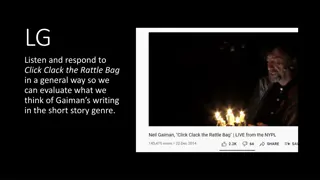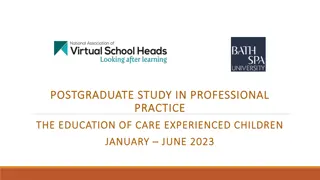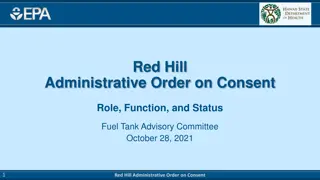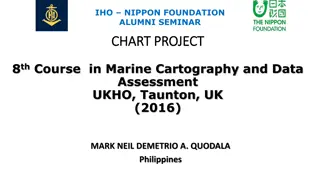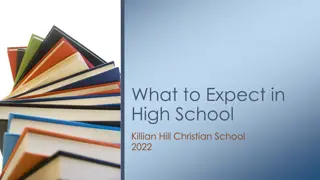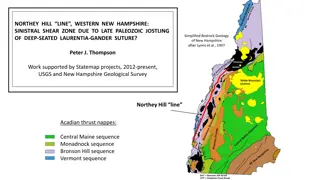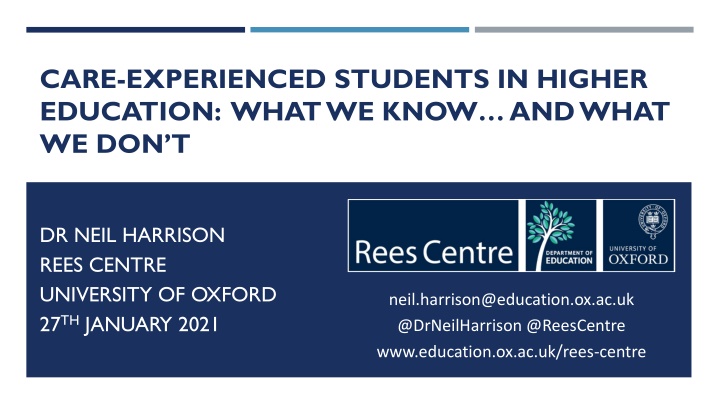
Care-Experienced Students in Higher Education: What we know... and what we don't
Delve into the world of care-experienced students in higher education, exploring their unique backgrounds, struggles, and the policies aimed at supporting their educational journey. Learn about the impacts of care experiences on academic success and societal outcomes.
Download Presentation

Please find below an Image/Link to download the presentation.
The content on the website is provided AS IS for your information and personal use only. It may not be sold, licensed, or shared on other websites without obtaining consent from the author. If you encounter any issues during the download, it is possible that the publisher has removed the file from their server.
You are allowed to download the files provided on this website for personal or commercial use, subject to the condition that they are used lawfully. All files are the property of their respective owners.
The content on the website is provided AS IS for your information and personal use only. It may not be sold, licensed, or shared on other websites without obtaining consent from the author.
E N D
Presentation Transcript
CARE-EXPERIENCED STUDENTS IN HIGHER EDUCATION: WHAT WE KNOW AND WHAT WE DON T DR NEIL HARRISON REES CENTRE UNIVERSITY OF OXFORD 27THJANUARY 2021 neil.harrison@education.ox.ac.uk @DrNeilHarrison @ReesCentre www.education.ox.ac.uk/rees-centre
QUICK BACKGROUND TO CARE Around 2% of children will be in care at some point in their lives Usually due to neglect, maltreatment or other trauma in the birth family About 75,000 children in care in England at any given time managed by local authorities Includes foster care, kinship care and residential care from one day to 18 years
WHY DOES CARE MATTER? Care-experienced people have among the least positive life outcomes of any social group: Lower levels of school attainment Higher risk of unemployment, poverty and homelessness Higher instances of mental health issues and substance abuse Greater involvement in the criminal justice system Care as a protective factor especially when stable, supportive and long-term Outcomes can be worse still for children in need
SOME DEFINITIONAL NOTES Seminar will focus mainly on England key differences across the UK Care-experienced students are those who spent any time in care as children Care leavers are those who were in care for a continuous three month period straddling their 16th birthday a formal status Care leavers have access to extensive leaving care support from their local authority personal adviser, funding, accommodation support and more Care-experienced students do not receive this support
TIMELINE OF KEY POLICIES 2007 Care Matters White Paper local authority bursaries for HE study and expectation of year-round accommodation 2012 Roll-out of Staying Put initiative to allow care leavers to remain with foster carers until the age of 25 if they are in education or training more recently, Staying Close for residential homes while studying 2014 Roll-out of Virtual Schools units within local authorities charged to monitor and improve school attainment for children in care and, more recently, administer the child-focused Pupil Premium Plus funding 2018 Launch of Care Leaver Covenant to challenge public and private organisations to offer more support for care leavers and requirement on local authorities to publish their Local Offer of support for care leavers 2019 Higher education providers required to monitor and report on recruitment of care-experienced students
A BUSY TIME FOR RESEARCH Moving on up: pathways of care leavers and care-experienced students into and through higher education Neil Harrison (2017) Pathways to university from care: findings report one Katie Ellis and Claire Johnston (2019) Being a student with care experience is very daunting : findings from a survey of care experienced students in Scottish colleges and universities Linda O Neill et al. (2019) 12 by 24 Centre for Social Justice (2019) Getting it right for care leavers in higher education Hanan Hauari et al. (2019) Positive impact? What factors affect access, retention and graduate outcomes for university students with a background of care or family estrangement? Jacqueline Stevenson et al. (2020)
MORE OFFICIAL DATA AVAILABLE DfE Widening Participation reports: www.gov.uk/government/collections/widening-participation-in-higher-education Office for Students reports: www.officeforstudents.org.uk/publications/differences-in-student-outcomes- further-characteristics Bespoke Higher Education Statistics Agency datasets: www.hesa.ac.uk/data-and-analysis/students Linked National Pupil Database data: www.gov.uk/guidance/how-to-access-department-for-education-dfe-data-extracts
STRUCTURE OF THE SEMINAR Before: access to higher education During: retention and success After: graduate outcomes Next: what we don t know
SOME QUICK ACCESS FACTS Around 7,000 care- experienced students in higher education in England 13% of care leavers participate in higher education by the age of 19 improving slowly Compares with 43% in the general population one of the most under- represented groups Over half of care- experienced full-time students are aged over 20 on entry Sources: Harrison (2017) and Department for Education (2020) Estimated that 30% of care-experienced adults will access higher education at some point
THE ROLE OF ATTAINMENT 80% 76.2% 72.3% 70% 71.3% Whole cohort Free school meals Care leavers 60% 50% 43.1% 40% 30% (Source: Harrison, 2017) 26.1% 20% 10% 11.8% 0% All young people Those with 8+ GCSEs (A* to C)
A COMPLEX PICTURE Mental health School stability Adult expectations Virtual school and others GCSEs Care placement
PRESSURE POINTS Young people with mid-range GCSE results esp. missing passes in English or Maths Access to Level 3 courses traditional pathway into higher education Quality of educational information, advice and guidance Young people with high-level GCSE results and special educational needs (esp. mental health issues and long-term illness) Concerns about continuity of support switch from child > adult services Concerns about accommodation, finance and coping with higher education
WHAT ABOUT THE REST? Many young people are simply not in a position to attain as high as they might at 16 or 18 Care-experienced students are much more likely to make use of alternative routes into higher education a bit later in life: Vocational qualifications Access to Higher Education diplomas Work-based learning, including foundation degrees
ACCESS TO WHAT? Care-experienced students are over- represented in lower status forms of higher education: 80% 70% 60% Russell Group 50% Post-1992 institutions 40% Other pre-1992 30% Sub-degree courses 20% Some subject concentrations: Post-1992 10% 0% More in social sciences, creative arts and computing Full-time Part-time Full-time Part-time Care-experienced Not care-experienced Fewer in natural sciences and humanities (Source: Harrison, 2017)
SOME HEADLINE FINDINGS Care leavers are nearly twice as likely to leave in their first year as other students about 13% Overall, about 1.38 times more likely to withdraw early compared to otherwise similar students Reasons for withdrawal similar to other students academic reasons are the most common reported If care leavers complete their degree, just as likely to get first or upper second as other students with similar entry qualifications Harrison (2017) and Office for Students (2020)
IMPORTANCE OF TRANSITIONS Wrong/changing/old information about support Need for liaison between local authority, university and foster carers managed transition Difficulties getting paperwork for financial support, accommodation and/or immigration Inappropriate accommodation offers Practical help with moving away (or staying put) black bags and taxis!
FITTING IN AND GETTING ON Anxieties about new community and fears about stigma and/or ignorance Need to consider the strategy for their new environment visibility of care experience Importance of relationships with key academic staff awareness of care-related issues Isolation for some living-at-home students with foster carers or in pre-university home
THRIVING AT UNIVERSITY Fragile academic identities managing gaps and setbacks Continuity of mental health support access to specialist therapeutic services Difficulties negotiating disability support Assistance with childcare financial and practical Issues with financial management and independent living Importance of single point of contact advocate and guide in higher education bureaucracy
NATIONAL GRADUATE DATA Destination of Leavers from Higher Education survey Data on those graduating in 2016/17 snapshot around six months after graduation Focus here on 171,680 graduates, including 1,010 (0.6%) self-declared care-experienced graduates: UK home only no EU or international students Full-time only no PT students (as little data on care) Stevenson et al. (2020) Degree level no sub-degree or postgraduate
HEADLINE OUTCOMES Working only Studying only Work + study mix Other activities Unemployed Care- Care- Care- Care- Care- experienced 60.9% experienced 20.7% experienced 7.2% experienced 5.5% experienced 5.7% Other graduates 66.6% Other graduates 18.7% Other graduates 5.9% Other graduates 4.4% Other graduates 4.4%
POSITIVE GRADUATE OUTCOMES Positive graduate outcome Postgraduate/ professional study = Professional job role or 70.1% of care-experienced graduates, compared to 72.3% of other graduates non-significant difference (p = 0.134) Strong relationship with degree class, university type, age and nationality
SIMILARITIES AND DIFFERENCES Patterns of graduate outcomes quite similar for care-experienced graduates Slightly less likely to be in work after six months: Less likely to be in professional work but same overall income profile Non-UK nationals more likely to be unemployed, plus graduates with lower degree classes and from universities outside the Russell Group Significantly more likely to be in postgraduate study after six months: Less likely to be studying in Russell Group universities across all degree outcomes More likely among disabled students and those from minority ethnic communities
A TRANSFORMATIVE EXPERIENCE Data demonstrate care-experienced students can thrive in higher education Once degree results are factored in, outcomes are actually slightly better than for other graduates Higher education as a comfortable and supportive space path into caring professions Potentially some anxieties about entering labour market fear of stigma and limited mobility Cautionary note: a strong survivor effect
WHAT WE DONT KNOW
GAPS IN OUR KNOWLEDGE (1) 1 2 3 Anything much about care-experienced students (a) in further education colleges, (b) on part-time programmes, or (c) over the age of 23. What interventions (pre- or post-16) by schools or universities are most effective in changing higher education trajectories or improving transitions. How second chance pathways into higher education should be best configured for care-experienced people.
GAPS IN OUR KNOWLEDGE (2) 4 5 6 The best model for holistic support at university, especially with respect to academic success and its relationship to mental health. What happens to care-experienced graduates more than six months after graduation and the underpinning reasons for their career choices. Whether different types of care (e.g. foster vs. residential) influence higher education outcomes, with respect to access, success and graduation.
CARE-EXPERIENCED STUDENTS IN HIGHER EDUCATION: WHAT WE KNOW AND WHAT WE DON T DR NEIL HARRISON REES CENTRE UNIVERSITY OF OXFORD 27TH JANUARY 2021 neil.harrison@education.ox.ac.uk @DrNeilHarrison @ReesCentre www.education.ox.ac.uk/rees-centre




